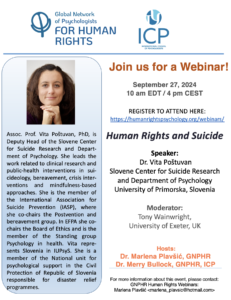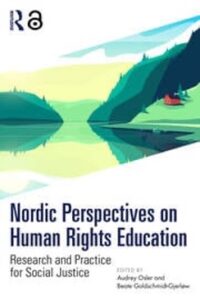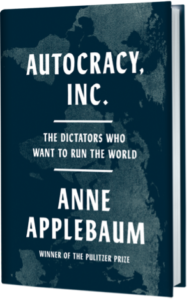Note from the Editors: The website of the Global Network of Psychologists for Human Rights (GNPHR) contains articles, events and news about the domain where psychology and human rights intersect. The information presented in this Bulletin is gathered from many sources and reflects many opinions. The publication of information does not imply that the GNPHR as a network, the GNPHR Steering Committee as a committee, or the individual subscribers share the views and beliefs expressed. The goal of the many opinions expressed is to stimulate reflection, discussion, and informed dialogue.

Table of Contents
SPECIAL FOCUS
SPECIAL FOCUS: UN International Day of Peace, 21 September 2024, Cultivating a Culture of Peace
 The International Day of Peace was established in 1981 by the United Nations General Assembly. Two decades later, in 2001, the General Assembly unanimously voted to designate the Day as a period of non-violence and cease-fire.
The International Day of Peace was established in 1981 by the United Nations General Assembly. Two decades later, in 2001, the General Assembly unanimously voted to designate the Day as a period of non-violence and cease-fire.
Declaration and Programme of Action on a Culture of Peace
In that declaration, the United Nations’ most inclusive body recognized that peace “not only is the absence of conflict, but also requires a positive, dynamic participatory process where dialogue is encouraged and conflicts are solved in a spirit of mutual understanding and cooperation.”
In a world with rising geopolitical tensions and protracted conflicts, there has never been a better time to remember how the UN General Assembly came together in 1999 to lay out the values needed for a culture of peace. These include: respect for life, human rights and fundamental freedoms; the promotion of non-violence through education, dialogue and cooperation; commitment to peaceful settlement of conflicts; and adherence to freedom, justice, democracy, tolerance, solidarity, cooperation, pluralism, cultural diversity, dialogue and understanding at all levels of society and among nations.
Young people living in conflict use poetry to express their hopes for a more peaceful future. UNICEF. WithPoems for Peace, UNICEF gives children a platform to explain in their own words the impact of conflict and war on their lives – and their hopes and dreams for the future. By amplifying the voices of children, UNICEF is highlighting the extraordinary strength and courage of young people longing for a more stable future.
Children in Gaza need life-saving support.
No safe place for children as humanitarian crisis deepens. The conflict in the Gaza Strip is taking a catastrophic toll on children. More than 14,000 children have reportedly been killed, according to the latest estimate by the Palestinian Ministry of Health; thousands more have been injured. There are no safe spaces. All of Gaza’s children have been exposed to the traumatic experiences of war, the consequences of which will last a lifetime.
Around 1.9 million people – about 9 in 10 of Gaza’s population – are estimated to have been internally displaced. Half of them children. They do not have enough access to water, food, fuel and medicine. Their homes have been destroyed; their families torn apart. Many children have been displaced multiple times, and have lost homes, parents and loved ones. They need to be protected, along with the remaining services that they rely on, including medical facilities and shelter.
Gaza’s children have endured unimaginable horrors – they deserve an immediate ceasefire and a chance for a peaceful future.
List of related UN Commemorative Days
- International Day of Conscience
- International Day of Sport for Development and Peace
- International Day of Multilateralism and Diplomacy for Peace
- International Day of Living Together in Peace
- International Day of UN Peacekeepers
- International Day of Non-Violence
- World Science Day for Peace and Development
- International Day of Neutrality
GNPHR NEWS AND EVENTS
Publication – Special Issue on Human Rights and Psychology – Available with OPEN ACCESS
![]()
GNPHR Human Rights and Psychology series

Next GNPHR webinar:
September 27, 2024, 10 am Eastern, 4 pm Central European
On human rights/suicide.
For recordings of all Webinars, see: https://humanrightspsychology.org/webinars/
For recordings of all Webinars, see: https://humanrightspsychology.org/webinars/
Promoting Human Rights Through Organized Psychology
Does your organization have an office, section, committee, or other group focusing on human rights and psychology? Their leader(s) might want to join the GNPR Network of Human Rights Groups in Psychology Organizations If your organization does not have such a group, is it interested in launching one?
Please click here to find out more information about the global Network of Human Rights Groups in Psychology Organizations. The focus of this network is sharing examples, best practices and mentoring on how to promote a human rights focus in psychology through local, national, regional, and international organizations.
CONTENT AREAS AND NEWS
General
Subjectivity and method: Why psychology needs more armchair scholarship. Thomas Teo, Theory and Psychology, Vol. 34, Issue 3.
Abstract: The argument is based on the premise that method follows subject matter. A representational view of methodology is discussed, arguing that a natural–scientific approach based on variabilization and subdivision of mental life is epistemically insufficient. Subjectivity as the subject matter of psychology must be studied with methods that are capable of addressing wholistic entities and integrating a mostly sociohistorical object, which can be addressed through the psychological humanities. The methodologism of psychology leads to a representational self-misunderstanding that simulates knowledge about human subjectivity but is based on artificial distinctions that are embedded in research practices removed from psychosocial reality. The case is made for representational as well as nonrepresentational psychologies that are grounded in the idea that parts of subjectivity address what is possible and not only what exists. It is concluded that psychology needs a much broader knowledge base and methodological canon, including armchair reflection, for an understanding of human mental life.
Children/Youth
Mothers with a history of trauma and their children: a systematic review of treatment interventions. Elisa van Ee, Eline M. Meuleman, Frontiers in Psychology, 15, 1293005.
The study underscores the importance of understanding the needs of mother–child dyads affected by trauma and tailoring interventions to meet those needs. Overall, the literature suggests that interventions combining psychotherapeutic, psychoeducational, and skills-training components are most effective in improving mother and child-related outcomes for mothers with a history of trauma and their young children. The review provides recommendations for future research and emphasizes the importance of considering the mother–child relationship in trauma-informed interventions.
Keeping child refugees separated from their families is cruel. Philip Veerman, Queen Mary, University of London, The Childhood, Law & Policy Network, 10 July 2024.
You have probably never heard of Ana Gulu. It is a village in the province Gash-Barka in the South-Western part of Eritrea (the country often called “the North Korea of Africa”). My patient, whom I will call Abraham for reasons of privacy, resided in this village until he was fourteen years of age. Abraham lived there with his uncle and aunt. His father passed away when he was three, and his mother when Abraham was four years old. No doubt that for Abraham his uncle and aunt are the two people with whom he made strong psychological ties and a strong attachment. He drew for me how his uncle and aunt, his younger biological brother, his stepbrothers and stepsisters were all sitting around a big plate with injera, a flat bubbly bread made from teff flower. He wrote in big letters next to the drawing (in Dutch) “my family, I miss you”.
His uncle had sheep and goats. Often Abraham was herding the sheep and goats. One morning he saw from afar that soldiers were entering the village and bringing adolescents to an army truck, forcibly conscripting young people into the Eritrean army. It has been well documented by the UN Commission of Inquiry on Human Rights in Eritrea that being forcefully conscripted into the Eritrean army can last for many years and servitude practices are routine. That morning Abraham hid, and the next day he fled to Sudan. There, traffickers spotted him and kept him hostage until his uncle had sold goats and a few golden necklaces of his aunt’s belongings and transferred the money to the traffickers. It is a miracle how this dependent, vulnerable young man survived on the back of a lorry through the desert in Libya and on a small boat to Italy. After all his travels, he ended up in the Netherlands and the guardianship organization for unaccompanied minors, known as NIDOS, placed him in a sheltered housing facility for adolescents and young adults in The Hague, which is run by the Youth Intervention Team.
Child protection systems in Australia continue to disproportionately investigate Aboriginal families and intervene to remove Aboriginal children, applying non-Indigenous constructs and understandings of child development that contribute to these enduring inequities. Attachment theory is one such prevalent framework with significant applications in child protection. While constructions of attachment have attempted to grapple with diversity, its application in Australian child protection policy and practice reflects dominant sociocultural perceptions as a foundation for decision making that misrepresents Aboriginal families and their children’s developmental needs. We position this socio-legal application of attachment specifically, and developmental sciences more broadly, within a long history of settler-colonial intervention, providing a facade of scientific authority that perpetrates further harms on Aboriginal children, families and communities. We offer insights about a new frame for attachment that respects Aboriginal worldviews as part of structural transformations to address those harms.
Climate Justice
The Legal Responsibility of Israel to Protect the Environment in Gaza. 2024 Blog Series: Climate Migration Now? ‘Eco-eco Migration’ and the Case of Non-EU National Researchers in the Netherlands. Samuel Ballin, 29 July 2024.
What is ‘eco-eco migration’?
‘Eco-eco migration’ explores the economic-ecological resilience of third country national migrant workers in the EU, and their differentiated rights under the various EU labour migration directives
Adam R. Pearson, et al., Group Processes & Intergroup Relations, April 22, 2024
As the impacts of climate change grow in frequency and intensity, climate justice—the recognition of climate change’s unequal impacts across populations, as well as inequities in the benefits and burdens from societal responses to climate change—has become a central focus of climate policymaking, advocacy, and scholarship. In this review, we take stock of these trends to consider what social psychologists can contribute to this discourse. We draw from integrative perspectives within the environmental social sciences, as well as emerging insights from psychology, communication, and public health, to highlight three areas with growing policy relevance that are ripe for social psychological inquiry: (a) understanding factors that influence climate vulnerability, its causes, and remediation; (b) identifying barriers and pathways to inclusive climate governance and decision-making; and (c) enhancing justice in climate solutions. For each, we consider the relevance of group and intergroup processes and highlight emerging empirical insights and key unanswered questions. We conclude by considering the urgency and challenges of translating psychological research to address climate injustice and highlighting opportunities for advancing the societal relevance of this research.
Advancing disability-inclusive climate research and action, climate justice, and climate-resilient development. Penelope J S Stein et al., Lancet Planet Health, e242-55, 2024.
Globally, more than 1 billion people with disabilities are disproportionately and differentially at risk from the climate crisis. Yet there is a notable absence of climate policy, programming, and research at the intersection of disability and climate change. Advancing climate justice urgently requires accelerated disability-inclusive climate action. We present pivotal research recommendations and guidance to advance disability-inclusive climate research and responses identified by a global interdisciplinary group of experts in disability, climate change, sustainable development, public health, environmental justice, humanitarianism, gender, Indigeneity, mental health, law, and planetary health. Climate-resilient development is a framework for enabling universal sustainable development. Advancing inclusive climate-resilient development requires a disability human rights approach that deepens understanding of how societal choices and actions—characterised by meaningful participation, inclusion, knowledge diversity in decision making, and co-design by and with people with disabilities and their representative organisations—build collective climate resilience benefiting disability communities and society at large while advancing planetary health.
Crimes against humanity
East Africa’s Swahili coast grapples with legacy of slave trade. Bastien RENOUIL, Élodie COUSIN, Olivia BIZOT, 30/08/2024 – FRANCE 24
Dotting East Africa’s Swahili coast, Zanzibar, Lamu and Mombasa are synonymous with pristine waters and white sandy beaches. But many tourists are unaware that these UNESCO World Heritage Sites were the scene of a gruesome chapter in history. For centuries, the Swahili coast was central to the slave trade. Between the 16th and early 20th centuries, Zanzibar, Lamu and Mombasa enjoyed immense wealth. The three locations were a key hub for trade between Africa, Oman, India and Europe. Ships that docked there left laden with spices, wood, ivory and gold… and enslaved people. Merchants like infamous Zanzibari slave trader Tippu Tip would capture men, women and children inland – sometimes even in the heart of the Congo – before bringing them back to the Swahili coast. Many of them were sold, while others were put to work in the fields. At the height of his dark enterprise, Tippu Tip forced almost 10,000 men to work on his clove plantations. In 1873, the British Empire imposed a ban on the slave trade. The practice finally came to an end at the beginning of the 20th century. Since then, memories of this period have gradually disappeared on the East African coast. But some are trying to keep the memory of those who suffered from slavery alive.
Decolonization / Indigenization and Human Rights Education
 Nordic countries’ involvement in the European colonial project and implications for human rights education. Marta Stachurska-Kounta, Routledge, 2024. Open Access. eBook ISBN 9781003340676
Nordic countries’ involvement in the European colonial project and implications for human rights education. Marta Stachurska-Kounta, Routledge, 2024. Open Access. eBook ISBN 9781003340676
The chapter discusses how the Nordic countries’ self-perception of being untouched by colonial legacies is an obstacle in addressing vital challenges within their educational systems, like exclusion, discrimination and racism. The tendency to ignore the Nordic colonial past reinforces a regional perception of the Nordic societies as post-racial, and ultimately undermines the ideals of inclusiveness and diversity that are inscribed in Nordic national curricula. Drawing on the textbook representations of colonialism, the chapter demonstrates that the textbooks tend to downplay Nordic colonial complicity and are often based on the assumption of a shared cultural and historical background. By emphasizing the inherently anti-human rights nature of colonialism, the chapter highlights a link between history education and human rights education and explores how the concept of historical awareness resonates with Homi Bhabha’s idea of ‘right to narrate’. Based on these reflections, the chapter draws attention to the teacher’s role in fostering critical thinking and empowering students to recognize and dismantle the colonial legacy.
Webinar: Facing the difficult past – Nordic involvement in European colonialism: implications for human rights education. Wednesday 9 October 2024 17.30-18.30 (Berlin CET); 16.30 – 17.30 (London). Register here
Inclusion, Exclusion, Racism
The August 2024 riots: Empowerment of the xenophobes. Blog by a social psychologist in Sussex university. John Drury, Sussex University, August 4, 2024.
The riots in some English towns this week came 13 years almost to the day after the wave of riots that swept England following the killing of Mark Duggan in London, 2011. There are some parallels, but also some crucial differences. The 2011 riots were driven to a significant extent by anti-police anger and resentment. The 2024 riots are driven by racism: xenophobia and Islamophobia. The other parallel is with what happened immediately after the Brexit vote in 2016 and the Trump victory in the same year. Each was followed by a spike in hate crimes, most of which were ‘racially’ motivated. The Trump victory was also followed by an upsurge in far-right street mobilizations. A lot has been said about the role of ‘coordination’ in the August 2024 xenophobic riots. But there is a significant ‘spontaneous’ element that also needs explanation, as does the relation between coordination and spontaneity in collective events like these. This is where social psychology comes in.
A short answer to the question of why the August riots spread is meta-perception and collective empowerment of specific group identities. ‘Meta-perception’ refers to what people believe about what other people believe. Collective empowerment in events like these can have different sources.
Activist Amna Abdullatif did not dare to leave her house for a week due to the British riots: ‘Many Muslims want to leave here’. Niels Posthumus, 28 August 2024, Trouw.
Amna Abdullatif: ‘Politicians act as if the Islamophobia together with the riots has now disappeared’.
The United Kingdom was recently shaken by far-right riots. The fear is well in the Muslim community, says anti-racism activist Amna Abdullatif. Precisely because Islamophobia is nothing new in the country. ‘In the nineties, people were already throwing stones at our house.’
Labor and Organizations
Upward mobility? Earnings trajectories for recent immigrants. Ben Brindle, Madeleine Sumption & Jonathan Portes, The Migration Observatory at the University of Oxford, Centre on Migration, Policy and Society (COMPAS), 28 Aug 2024.
This analysis uses new data from HMRC to show how the size and earnings of the migrant employee workforce has changed over time in recent years.
LGBTQI+, Gender Rights
Beyond Binaries: intersex in Islamic legal tradition.
Utrecht University, Department of Philosophy and Religious Studies.
While since the fourteenth century Shiʿi jurists proposed a third sex and/or gender to categorise intersex individuals, contemporary Islamic discourses employ a binary gender and sex logic. Challenging the binary approach, this legal-hermeneutical study examines the little-understood non-binary conceptions of sex and/or gender in Shiʿi Islamic law, which remain essential for intersex and transgender Muslims today.
Beyond Binaries aims to question the currently dominant approaches of traditional Muslim scholars and the orientalists which predispose Islam to an unequivocal intolerance of trans-genderism or non-binary sex/gender divisions. Focusing on Muslim legal discourse, it will demonstrate that Islamic views toward sex or gender are oftentimes surprisingly dynamic. Notably, since the post-classical period (the 14th c. CE), several Shiʿi jurists have categorised intersex people as a third nature (third sex and/or gender). However, the tendency of scholars in the West to delve into classical Islamic sources has left the post-classical and early modern debates on intersex virtually untouched. This neglected idea of a third nature presents a challenge to the binary conceptions of sex or gender in Islamic Studies. This project thus examines the legal assessment of intersex as a third category in Shiʿi law from the post-classical period to the early twentieth century.
LGBTIQ equality at a crossroads – Progress and challenges. FRA, Vienna, May 2024.
FRA’s survey is one of the biggest of its kind globally. It analyses the experiences of over 100,000 LGBTIQ people of all backgrounds aged 15 years and above in the EU and neighbouring countries. This is the third wave of the survey FRA first conducted in 2012 and again in 2019. It presents results showing gradual progress in equality over time. The findings contribute to developing legal and policy responses to meet the needs of LGBTIQ people and protect their fundamental rights. The report sets out ways forward for the EU and Member States to ensure dignity and equality. Now is a critical moment to step up efforts.
In this report:
- Why is this survey needed?
- Survey in a nutshell
- Key concepts and terminology
- Assessing progress – comparing selected results from 2019 and 2023
- Discrimination and awareness of rights; Assessing progress between 2019 and 2023 – selected results; Key 2023 survey findings
- Violence and harassment; Assessing progress between 2019 and 2023 – selected results; Key 2023 survey findings
- Life and dignity in inclusive societies; Assessing progress between 2019 and 2023 – selected results; Key 2023 survey findings.
Conversion Therapy Is a Symptom of Russia’s Crisis. I Know, I Survived It. Ada Blakewell. The Moscow Times, January, 2024.
The story of how I escaped kidnapping and survived conversion therapy in Russia formed part of a recent report in The Moscow Times. I was beaten and forced to castrate a pig because I wanted gender-affirming surgery. Unfortunately, I am not the only one who has faced this struggle. Through collaborative efforts with a few other queer activists, I have documented over 5 similar cases over the past six months. While conversion therapy used to be confined to the southern regions of Russia, today it has spread across the country. This trend is a troubling illustration of Russia’s trajectory.
Mental Health and Human Rights
Bangladesh needs to put a stop to malpractice in mental health-care services. Md Omar Faruk, Shamsul Haque, et al. THE LANCET, 11-8, P588-589, August, 2024.
Bangladesh needs to put a stop to malpractice in mental health-care Services. Bangladesh passed its National Mental Health Act in 2018, replacing the century-old Indian Lunacy Act (1912), and passed its National Mental Health Policy in 2022. The National Mental Health Act offers guidelines on monitoring mental health hospitals and rehabilitation centres nation wide. The act also includes rules for assessing, admitting, and treating people with mental health problems. The National Mental Health Strategic Plan (2020–30) highlights an urgent need to develop a management structure for mental health programmes and deploy a new leadership within the health services department to monitor programmes and services based on well planned guidelines; however, no indication is given to form a regulatory body involving mental health experts that could devise a code of practice to help streamline psychological services.
Dehumanization and mental health. Nick Haslam, World Psychiatry, Vol. 23, Issue 2, June 2024.
Dehumanization is a fearsome word, calling to mind the gravest atrocities of the past and present. People seen as less than human have suffered and suffer violence, deprivation, exclusion and dispossession, and that suffering has been and is routinely ignored or minimized. However, although dehumanization is usually understood as an extreme phenomenon confined to wars, genocides and conquests, it falls on a spectrum. Two decades of social psychological research have shown that it has significant repercussions in everyday life. The burgeoning literature on dehumanization offers three key insights. First, dehumanization ranges from blatant and verbalized to subtle and unconscious: people can be explicitly likened to animals, but also implicitly denied fundamental human qualities such as rationality, self-control and complex emotions. Second, dehumanization takes varied forms, from seeing others as bestial or robotic, to rejecting their individuality or agency, to failing to spontaneously grant them minds. Third, although dehumanization often accompanies negative views of others, it is psychologically and even neurally distinct from prejudice. Seeing people as less than fully human is not the same as disliking them. We can dehumanize those about whom we are indifferent, not only those we hate. Indeed, studies of close relationships show that we can subtly dehumanize those we love.
Poverty
How rich is too rich? Lucas Chancel, Nature, Book review, May 2024.
Where should society draw the line on extreme wealth? A fresh account sets out the logic and suggests how to redress inequality.
As radical as they might seem, calls for limits on wealth are as old as civilization itself. The Hebrew Bible and Torah recognized years during which debts should be cancelled, slaves set free and property redistributed from rich to poor. In classical Greece, Aristotle praised cities that kept wealth inequality in check to enhance political stability. And in 1942, then-US president Franklin D. Roosevelt argued that annual incomes should be capped at the current equivalent of US$480,000.
In Limitarianism, Dutch and Belgian economist and philosopher Ingrid Robeyns argues that it’s time for twenty-first-century governments to do the same. She explores what setting limits on wealth ownership might mean, and why our societies should want to do so. It is a fresh take on a much-needed discussion at a time when, for example, the richest 1% of the US population owns about as much wealth as the bottom 90%.
Limitarianism: The Case Against Extreme Wealth Ingrid Robeyns Allen Lane (2024)
Women
Ambivalent Sexism and Tolerance of Violence Against Women in India. Nikhil K. Sengupta et al. Psychological Science, APS, 35-7, June 2024.
We examined associations between sexist beliefs and tolerance of violence against women in India using a nationally representative probability sample of adults (n = 133,398). Research consistently indicates that hostile sexism fosters tolerance of violence against women. However, benevolent sexism is sometimes associated with higher tolerance and sometimes with lower tolerance of violence. We proposed that this inconsistency could be resolved by considering the source of violence: Is violence perpetrated by outsiders or intimate partners? Results of a multigroup structural equation model showed that endorsement of hostile sexism was related to greater tolerance of violence regardless of the source. In contrast, endorsement of benevolent sexism was associated with lower tolerance of violence from outsiders but was simultaneously associated with higher tolerance of spousal violence. These opposing processes indicate that although benevolent sexism promises women protection from violence, the very same ideology legitimizes spousal violence, thereby reinforcing men’s power within intimate relationships.
Afghan women erased by the Taliban as the international community looks on. Pauline ROUQUETTE,FRANCE 24, 31 August 2024.
The oppression of Afghan women continues unabated before the eyes of the world. The Taliban imposed severe new restrictions earlier this month, with women not only obliged to cover their faces but now forbidden from raising their voices, singing or reading aloud in public. Western countries – led by the US and EU – have condemned the new laws but also seem resigned to the Taliban regime, which offers some stability in the region.
Invisible, and now silent. Three years after the Taliban’s return to power, Afghan women continue to see their few remaining rights dwindle away. A Taliban ministry promulgated a new set of laws on August 21 that it said “will be of great help in the promotion of virtue and the prevention of vice”. The laws aim to control all aspects of the social and private life of Afghans, especially of Afghan women. Among the rules in the 114-page text published by the ministry is the requirement for women to cover their bodies and faces completely if they leave the house as well as a ban on women making their voices heard in public.
The new laws are “attacking their very existence”, Chekeba Hachemi, president of the organisation Free Afghanistan, told FRANCE 24. “We no longer have the right to hear the sound of a woman’s voice, or to see even a glimpse of a woman’s body. It’s as if we were telling them: ‘We want to kill you slowly’.” “The only right we are allowed is to breathe. And even then …” Hamida Aman, the founder of Begum TV, a Paris-based channel aimed at educating Afghan women and girls, told France Culture.
Paris-based Begum TV: A ‘window to the world’ for women in Afghanistan.Begum TV, launched March 8, 2024. 25 March 2024 – FRANCE24
Officially launched on March 8, 2024, the channel based in Paris, is accessible by satellite in Afghanistan. Begum TV offers educational and mental health programming targeted at women living there. The channel’s main mission is to provide access to education, as teenage girls and women are barred from secondary schools and universities in Afghanistan.
PUBLICATIONS
 Autocracy, Inc The dictators who want to run the world, Doubleday, Penguin Random House, July 2024. Review – fears for liberalism and democracy.
Autocracy, Inc The dictators who want to run the world, Doubleday, Penguin Random House, July 2024. Review – fears for liberalism and democracy.
Anne Applebaum’s book charts the rise of the world’s strongmen. Has the rules-based international order been defeated? Lloyd Green, The Guardian, 27 Jul 2024.
“There is no liberal world order any more, and the aspiration to create one no longer seems real,” Anne Applebaum writes in her new book, Autocracy, Inc: The Dictators Who Want to Run the World.
 Colonised Minds, Narratives that Shape Psychology, Akira O’Connor & Erin Robbins, Sage, May 2024.
Colonised Minds, Narratives that Shape Psychology, Akira O’Connor & Erin Robbins, Sage, May 2024.
Psychology, as it is taught in the Global North, strives to be an objective science beyond reproach – but what happens when we examine the discipline critically, through an anti-colonial lens?
This text pulls back the curtain on the existing canon to reveal the historical power structures that shaped the discipline, and examines the extent to which psychology today continues to uphold oppression. Colonised Minds situates current teaching and research of major topics in the field of psychology within the context of colonialism to better understand how some ideas were allowed to flourish while others were suppressed, censored, or left behind. This book will also direct you to critical, antiracist, and feminist approaches for the field and the modern university more generally – looking to voices and perspectives that have been marginalised for ways to rethink the way we see, and teach, psychology.
 White Malice: The CIA and the Neocolonisation of Africa. Susan Williams, June 2023
White Malice: The CIA and the Neocolonisation of Africa. Susan Williams, June 2023
The shocking, untold story of how African independence was strangled at birth by America’s systematic interference.
Accra, 1958. Africa’s liberation leaders have gathered for a conference, full of strength, purpose and vision. Newly independent Ghana’s Kwame Nkrumah and Congo’s Patrice Lumumba strike up a close partnership. Everything seems possible. But, within a few years, both men will have been targeted by the CIA, and their dream of true African autonomy undermined.
 Negotiating Homosexuality in Islam: A Legal-hermeneutical Examination of Modern Shiʿi Discourse (Series: Studies in Islamic Law and Society, Volume: 55), 345 pp, Leiden-Boston: Brill, 2024.
Negotiating Homosexuality in Islam: A Legal-hermeneutical Examination of Modern Shiʿi Discourse (Series: Studies in Islamic Law and Society, Volume: 55), 345 pp, Leiden-Boston: Brill, 2024.
“To enrich the existing debates on Islam and sexual diversity, in the present book, I seek the potential discursive spaces on homosexuality in modern Imāmī legal debates. I have undertaken this research on the thesis that modern Imāmī legal tradition on homosexuality is more flexible and dynamic than one might expect. To address this essential issue, I build the study around the following constructive question: what are the discursive spaces on homosexuality in contemporary reflections within modern Shiʿi legal scholarship? Responding to this central query, the study is premised on the notion that Imāmī legal sources consist of a tradition of sacred (textual) sources, intellectual reasoning, a vast stockpile of (often contrasting) interpretations of these sources, and a distinguished methodological repertoire called ijtihād. Following the same methodology, in this work, I describe, analyse, and critique such textual-exegetical and intellectual-rational discursive aspects concerning homosexuality. This study rigorously departs itself from the trap of ongoing and, in my opinion, fruitless debates on the epistemology of homosexuality in terms of essentialism or social constructionism. Instead, it has chosen to emphasise a methodology whereby one can explore whether a given topic such as homosexuality fulfils the general criteria of Islamic legal system, that is, to investigate whether this topic violates the rights of Allāh or the rights of other humans established in Islamic sources. For this purpose, I picked the modern Shiʿi paradigm of ijtihād which, in my view, has the magnitude to attest the (in)compatibility between Islamic law and homosexuality. Hence, it puts forth insights which may contribute to an alternative methodological attitude to the field of Islamic studies. I am aware that my overall approach is experimental, and this indeed makes it a unique piece of scholarship which still requires further examination by other intellectuals.
 The rage of replacement: far right politics and demographic fear. Michael Feola, University of Minnesota Press, Minneapolis, ISBN: 978-1-5179-1680-0, 2024.
The rage of replacement: far right politics and demographic fear. Michael Feola, University of Minnesota Press, Minneapolis, ISBN: 978-1-5179-1680-0, 2024.
It is often said that our time is defined by rage. Indeed, many of the iconic images of contemporary politics amount to gestures of anger. Recent years have been defined by protesters spilling into the streets, overturning cars, tearing down monuments, and storming the halls of power. Nations have seen uprisings of rage in response to police brutality, contested elections, and judicial decisions.¹ Public officials stage spectacles of fury when their decisions or characters are questioned. And there is perhaps no better way to describe the current far right than as a movement of rage, oriented against a broad variety.
OPPORTUNITIES
Awards
2024 Charles Baldwin Award Deadline September 23, 2024. For Human Rights Defender Outside of the United States
Miller Human Rights Award – Deadline Decemver 1, 2025. For students who wish to broaden human rights expeience through volunteer work.
Neal S. Rubin and Roseanne L. Flores Award Student Research Award in Human Rights and Psychology – Deadline April 2025
RESOURCES
Human Rights Education Resources: HREA, Search by Human Rights theme. https://hrea.org/resources/
UPCOMING EVENTS
The International Council of Psychologists 83rd Annual Conference
JOIN the International Council of Psychologists in Rotterdam, Netherlands for its 2025 Annual International Conference!
This vibrant conference will celebrate ICP’s mission to support Human rights, Dignity, and Justice: Social Inclusion and Migration
Location: Rotterdam, Erasmus University College
CALL FOR PAPERS: https://icpweb.org/icp-annual-conference/call-for-proposals-icp2025/
40th Annual Conference of Human Dignity and Humiliation Studies. ‘Global Vulnerabilities – From Humiliation to Dignity and Solidarity’. Madrid, Spain, 17th – 20th September 2024
Please visit this webpage regularly for the latest information, as plans for this conference unfold.
If you wish to participate, please register here! Please know that you are invited to spend the entire conference with us, so that true dignity-family-building can emerge! All our events are part of an ongoing effort to nurture a global dignity community.
There is no registration fee, we share minimal cost according to ability at the end.
EXPLORE THE RICH TAPESTRY OF CONFERENCES IN SOUTH AFRICA
From psychology to commerce, and from social issues to academic research, the conference landscape in South Africa is as diverse as it is dynamic. Here are four noteworthy conferences that are set to captivate attendees with their innovative themes, thought-provoking discussions, and networking opportunities.
PAPU Conference: Uniting Africa
8 -11 October 2024 – Johannesburg, South Africa
The Pan-African Psychology Union (PAPU) Congress stands as a beacon of unity and collaboration, bringing together psychologists, researchers, and scholars from across Africa and beyond. This conference serves as a platform for discussing pressing issues facing the continent, exploring cultural nuances in psychology, and fostering interdisciplinary connections. This year is the 10th anniversary of the Pan-African Psychology Congress.
PSYSSA Congress: Advancing Psychological Science in South Africa
8 – 11 October, 2024 – Johannesburg, South Africa
In 2024, South Africa will celebrate the 30th anniversary of democracy and the end of Apartheid. South Africa’s national psychology body is celebrating its 30th anniversary, having been established three months before the country’s liberation. Over the past 30 years of democracy, the country has faced issues that require continued engagement and fight. However, psychology has advanced significantly during this time and has grown stronger since the democratic age. PsySSA was founded on democratic principles and aims to serve all psychology professionals, in contrast to previous associations.
INHS Biennial Conference: Exploring the Dynamics of Hate
25 – 27 November 2024- Cape Town, South Africa
The International Network for Hate Studies (INHS) is pleased to issue a call for papers for the fifth conference, “Dynamics of Hate: Examining Interdisciplinary Perspectives”. The University of South Africa (Unisa) and the Psychological Society of South Africa (PsySSA) will co-host the first INHS conference in the Southern Hemisphere. From hate speech to hate crimes, this conference delves into interdisciplinary perspectives to understand and combat hatred in all its forms.
CONTACTS: Published by the Global Network of Psychologists for Human Rights – www.humanrightspsychology.org
Disclaimer: The website of the Global Network of Psychologists for Human Rights (GNPHR) contains articles, events and news about the domain where psychology and human rights intersect. The information presented in this Bulletin, does not imply that the GNPHR shares the views and beliefs in the articles.
- @GNPHR1
- How to get involved – read how you can contribute to the global network
- Consider contributing a Blog/Commentary
- News and Bulletins from the GNPHR – Subscribe to GNPHR
- Email addresses:
Ways to Participate in Global Network Activities
- Share Your Experiences and Examples
One of the best ways to illustrate the intersection of psychology and human rights is through example. We are looking for examples of your encounters with human rights issues in your professional life. You might describe a time when you protected (or failed to protect) human rights, or advocated for what you saw as a human rights issue. The events might be in your clinical, research, academic, applied, or volunteer work. Please send your narrative / story (500-1000 words) to Marlena Plavšić (marlena_plavsic@hotmail.com). We will compile these for publication in the GNPHR Bulletin and on the website. Please also indicate if you would like your stories to remain anonymous. - Share your Expertise and Opinions
We invite you to contribute a blog or opinion piece on general human rights issues; human rights education or strategies for raising the profile of human rights within psychology or your professional life. Students are welcome to contribute, including on student needs for learning about and addressing human rights. Please contact the GNPHR Blog editor (blogeditor@humanrightspsychology.org) with ideas for the article you would like to write! - Send articles/news/events
If you come across a human rights article or news, or know of an upcoming hunman rights event, please send for publication in the Bulletin. Send to the Bulletin editor Polli Hagenaars (polli.hagenaars@gmail.com).


Many thanks to Prof. Z.K Dagona of the University of Jos, Nigeria for informing me of this lofty initiative via a post he sent to me.
This will serve as a verable tool for information dissemination, collaboration and cooperation for global action against crimes against humanity with respect to the critical role of the discipline of Psychology. With the rate at which violent crimes have become common place in our societies, a call for the global community of the Psychologists ripe.